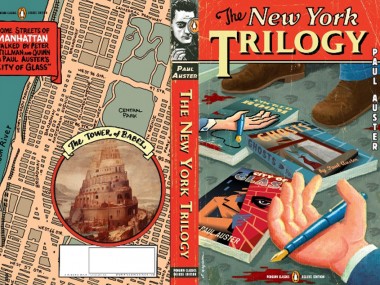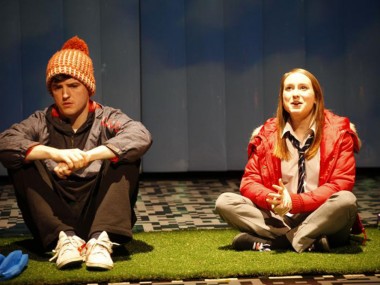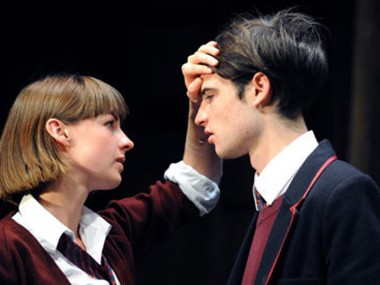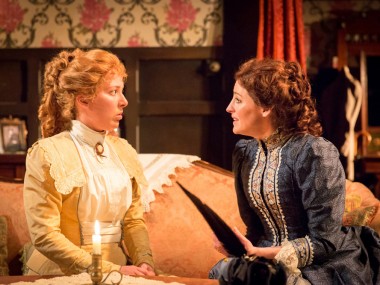Barbarians, Central St Martins
Thursday 8th October 2015
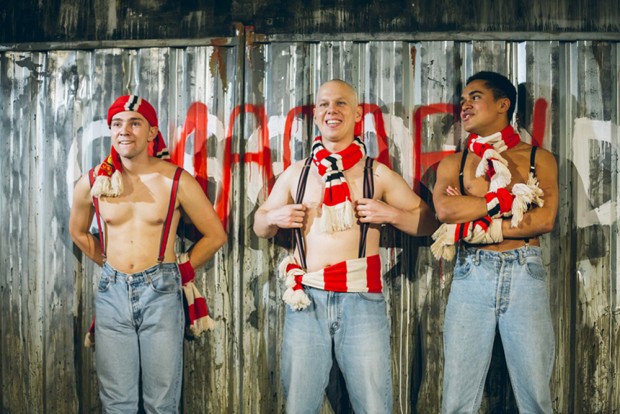
“Life is a shit sandwich — the more bread you’ve got, the less shit you have to swallow.” Yeah. A great opening line. Barrie Keeffe’s Barbarians, a trilogy of plays first staged in 1977 and now revived by the Tooting Arts Club in the found space of the abandoned Central St Martins school of art, kicks off with exactly the right tone of juvenile disillusionment and class antagonism. Spoken by a teenager who’s standing on his hands against a wall, it’s an opener that not only grabs your attention, but also shows that Keeffe’s distinctive writing style must surely have had an influence on Jim Cartwright’s Road. Both plays explore the social and mental landscape of a country blighted by unemployment — a kind of teenage wasteland.
Central St Martins in the Charing Cross Road is a place whose now dusty corridors, narrow staircases and decrepit iron lift shaft hold the ghosts of thousands of art students whose creativity and enthusiasm once echoed around these halls and rooms. Up the old stone stairwell, with its chipped paint and decayed walls, we arrive in a small bar whose chairs, pool table and darts board, plus its trendy young clientele, suggest a mix of 2010s student with 1970s retro. Everywhere, sexual scribblings can be found next to anarchist symbols; there is situationist and punk graffiti, attacking the boredom of daily life. All this reminds us that this was the location of the very first Sex Pistols gig in late 1975, an event that only lasted 20 minutes before the audience threw the band off the stage. Yes, it’s the 1970s, and, as well as punk, there are skinheads on the streets and violence in the air.
As we are ushered into the first room for the first play of the trilogy, we rapidly meet the three characters who make up the cast: Paul is a teenager with little prospects, but with a raw nervous energy and the gift of the gab; 16-year-old Jan is impressionable, a follower rather than a leader; while Louis is a bit more sensitive and a bit more ambitious than the other two. He has done a year’s training in refrigeration. They are working class boys with few qualifications in a society where the traditional unskilled jobs are becoming scarcer, and they are on the dole. In the first play, aptly called Killing Time, they are hanging around, until Paul — the instigator of their activities — suggests that they try and find a car for his cousin to steal. If they spot the right one, his cousin will “bung them thirty quid”. As well as introducing them as individuals, Keeffe expertly brings out the jokiness, dirty stories and competitiveness of their camaraderie.
The second play, Abide with Me, sees the trio decked out in Man Utd regalia, at Wembley for the 1976 FA Cup Final. Needless to say, they have no tickets so their frustration is palpable. Jan has placed all his faith in his Uncle Harold, who he believes will see them right, while Paul takes out his anger on a corrugated metal wall, which is powerful visual metaphor for their exclusion from the mainstream. Finally, In the City is set a year later during the Notting Hill Carnival, where Jan, who has joined the army, is looking for a good time before being posted to Northern Ireland. As he worries about being shot by an IRA sniper, the sexual and racial and psychological tensions inherent in the relationships between the three explode in a shocking act of violence.
Keeffe’s writing style is dirty demotic: his dialogues are gritty, vulgar, and casually racist, but also have moments of humour, poetry and insight. While the boys tell each other vivid stories about sex, work, petty crime and sports, a picture emerges of young men whose ideas about masculinity are threatened by the idea of working in same factory as “the bints” and whose sexuality is being sublimated into violence. They also represent a whole working-class generation that has been abandoned, which makes this trilogy as relevant today as it was in 1977. Keeffe can occasionally be a tad didactic, as when an off-stage speech gives the facts and figures of school-leaver joblessness or when Louis explains that the hymn “Abide with Me” is a plea for tolerance, and he ends each play with a powerful political point: if you treat us like animals, we will behave like animals. Barbarians indeed.
Bill Buckhurst’s production moves from one graffiti-sprayed room to another, using the atmospheric space to great effect. Simon Kenny’s sets are as hard and brutal as the playtext. In the first play, the audience sits at tables while the excellent cast energetically engage with them, jumping on tables and moving freely around the room: there’s a distinct whiff of danger and threat in their proximity. And each actor is thoroughly convincing: Thomas Coombes’s bragging, vicious Paul, Jake Davies’s dim and insecure Jan and Josh Williams’s more good-natured Louis. They make the most of Keeffe’s ability to explore the mental world of young people and to show how the roots of destructiveness lie in individual psychology. So while the evening crackles with the aggressive punky spirit of the 1970s, Williams makes you proud of his character’s progress, Davies makes you want to send his back to school, and Coombes can be stunningly scary. The overall effect is highly emotional and powerfully moving.
© Aleks Sierz

